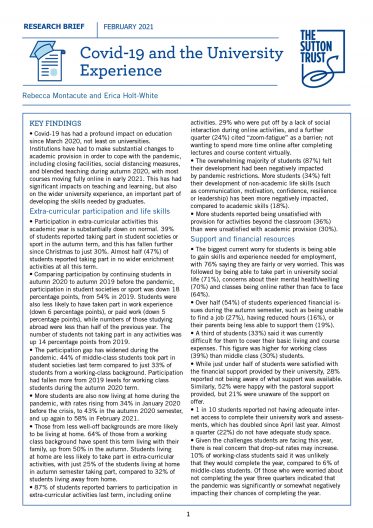• Covid-19 has had a profound impact on education since March 2020, not least on universities. Institutions have had to make substantial changes to academic provision in order to cope with the pandemic, including closing facilities, social distancing measures, and blended teaching during autumn 2020, with most courses moving fully online in early 2021. This has had significant impacts on teaching and learning, but also on the wider university experience, an important part of developing the skills needed by graduates.
Extra-curricular participation and life skills
• Participation in extra-curricular activities this academic year is substantially down on normal. 39% of students reported taking part in student societies or sport in the autumn term, and this has fallen further since Christmas to just 30%. Almost half (47%) of students reported taking part in no wider enrichment activities at all this term.
• Comparing participation by continuing students in autumn 2020 to autumn 2019 before the pandemic, participation in student societies or sport was down 18 percentage points, from 54% in 2019. Students were also less likely to have taken part in work experience (down 6 percentage points), or paid work (down 5 percentage points), while numbers of those studying abroad were less than half of the previous year. The number of students not taking part in any activities was up 14 percentage points from 2019.
• The participation gap has widened during the pandemic. 44% of middle-class students took part in student societies last term compared to just 33% of students from a working-class background. Participation had fallen more from 2019 levels for working class students during the autumn 2020 term.
• More students are also now living at home during the pandemic, with rates rising from 34% in January 2020 before the crisis, to 43% in the autumn 2020 semester, and up again to 58% in February 2021.
• Those from less well-off backgrounds are more likely to be living at home. 64% of those from a working class background have spent this term living with their family, up from 50% in the autumn and 41% pre pandemic.
• 87% of students reported barriers to participation in extra-curricular activities last term, including online activities. 29% who were put off by a lack of social interaction during online activities, and a further quarter (24%) cited “zoom-fatigue” as a barrier; not wanting to spend more time online after completing lectures and course content virtually.
• More students (34%) felt their development of non-academic life skills (such as communication, motivation, confidence, resilience or leadership) has been more negatively impacted by the pandemic, compared to academic skills (18%).
Support and financial resources
• The biggest current worry for students is being able to gain skills and experience needed for employment, with 76% saying they are fairly or very worried. This was followed by being able to take part in university social life (71%), concerns about their mental health/welling (70%) and classes being online rather than face to face (64%).
• Over half (54%) of students experienced financial issues during the autumn semester, such as being unable to find a job (27%), having reduced hours (16%), or their parents being less able to support them (19%).
• A third of students (33%) said it was currently difficult for them to cover their basic living and course expenses. This figure was higher for working class (39%) than middle class (30%) students.
• While just under half of students were satisfied with the financial support provided by their university, 28% reported not being aware of what support was available. Similarly, 52% were happy with the pastoral support provided, but 21% were unaware of the support on offer.
• Given the challenges students are facing this year, there is real concern that drop-out rates may increase. 10% of working-class students said it was unlikely that they would complete the year, compared to 6% of middle-class students. Of those who were worried about not completing the year three quarters indicated that the pandemic was significantly or somewhat negatively impacting their chances of completing the year.
